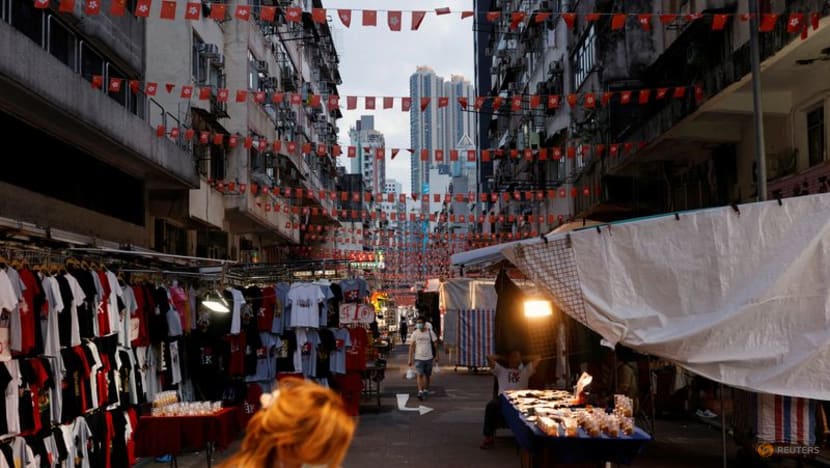Commentary: To bring back nightlife, Hong Kong needs to upgrade its night markets
Hong Kong has launched a campaign to save its nightlife businesses, but the efforts have not been well-received so far, says former journalist Jacky Leung.

LONDON: Hong Kong's COVID-19 restrictions have been lifted for months, and daily life seems to be back to normal. However, one thing has changed fundamentally - Hong Kongers spend more time at home after work, and the city’s nightlife is not as vibrant as before.
If you travel to Hong Kong right now, you will find that public trains are less busy than they used to be after working hours. Some overnight minibuses have even quietly stopped operating.
Popular restaurants may still have a queue during dinner, but many waiters mainly look on at empty tables, especially on weekdays. After multiple lockdowns and tight evening dine-in restrictions, Hong Kongers have clearly adapted to the new routine.
The government, therefore, launched the “Night Vibes Hong Kong” campaign last month to save dining and entertainment businesses. The campaign encompasses night-time events and festivals to rejuvenate the faded image of “the city that never sleeps”.
It is urgently needed as Hong Kong's economic data is not looking good.
In the second quarter of 2023, Hong Kong’s economy grew 1.5 per cent year-on-year, down from 2.9 per cent in the first quarter. Due to the uncertainty of the global economy, fixed capital investment and exports declined.
Despite promotional campaigns and thousands of free flight tickets to lure tourists, the number of visitor arrivals is still less than half of that before the pandemic.
Private consumption is a relatively bright spot, registering an 8.5 per cent year-on-year increase in the second quarter of 2023. However, it has yet to fully recover. One reason is that locals are more willing to shop and dine in locales like Shenzhen and Japan. The desire to travel and experience what they missed during COVID-19 has held back local spending.
MIXED RECEPTION OF NIGHT VIBES HONG KONG
In that sense, boosting the night-time economy by spurring domestic consumption is rational. However, the campaign has not been received well by locals so far.
One of the first features of Night Vibes Hong Kong is night markets along the city’s famed waterfronts. But some netizens have mocked the expensive street food there, which can cost up to triple the prices at other markets.
The night market concept has also reminded the public that the government has refused to issue new hawker licenses since 1972, out of possible obstruction and hygiene issues. The government’s defence is that the shopping habits of Hong Kongers have changed as retail experiences developed.
Without a policy change, down-to-earth street food will be increasingly difficult to find in Hong Kong.
According to official figures, the three night markets attracted around 100,000 visitors over the Oct 1 National Day weekend, which is not a bad number. However, it is a fraction of Hong Kongers who travelled abroad around the same time – in the same weekend of Sep 29 to Oct 1, almost 1 million Hong Kong residents left the city’s immigration checkpoints.
To echo the government’s initiative, several shopping malls have also extended opening hours, but only a few tenant shops have followed suit. Food and beverage businesses and retailers say slow business, combined with rising manpower costs and the difficulty of hiring up-to-standard staff, have made longer opening hours unsustainable.
REVITALISING HONG KONG’S ICONIC NIGHT MARKETS
As locals have argued, resources could be allocated to update Hong Kong’s ageing night markets, instead of building them from scratch.
Temple Street is arguably the most famous night market in Hong Kong, with its decades-long history. The Yaumatei Temple Street Association of Hawkers and Shop Operators has urged the government to transform the night market into a tourist spot that meets modern standards.
When I visited the Temple Street night market this year, I found that it had plenty of local flavour with its fortune-telling services, street performances and karaoke stalls, but the food offerings lacked variety. The Hong Kong Hawkers Association has also admitted that the dry goods stalls mostly sell made-in-China products and are not attractive to foreign visitors.
Investing in Temple Street to create an attractive night market will take time. The Hong Kong Tourism Board has said that it is working with trade associations and government bodies to plan food markets and festive events to “enhance the overall vibe of Temple Street”, but details have yet to be announced.
To save Hong Kong's economy, and lure Hong Kongers and tourists back into the city’s nightlife, short-term promotion is one solution.
Night Vibes Hong Kong has organised firework displays and Halloween celebrations, which certainly fits the campaign’s theme. Still, such attractions have been annual occurrences in Hong Kong for at least a decade, so locals and visitors may be left wanting for fresh experiences.
Hong Kong does not have an F1 race and Taylor Swift concerts to promote the city as Singapore does. It may take more creativity to reawaken the city that once never slept.
Jacky Leung is an award-winning journalist who has worked in multiple Hong Kong TV and radio news stations. He is currently based in London.


















